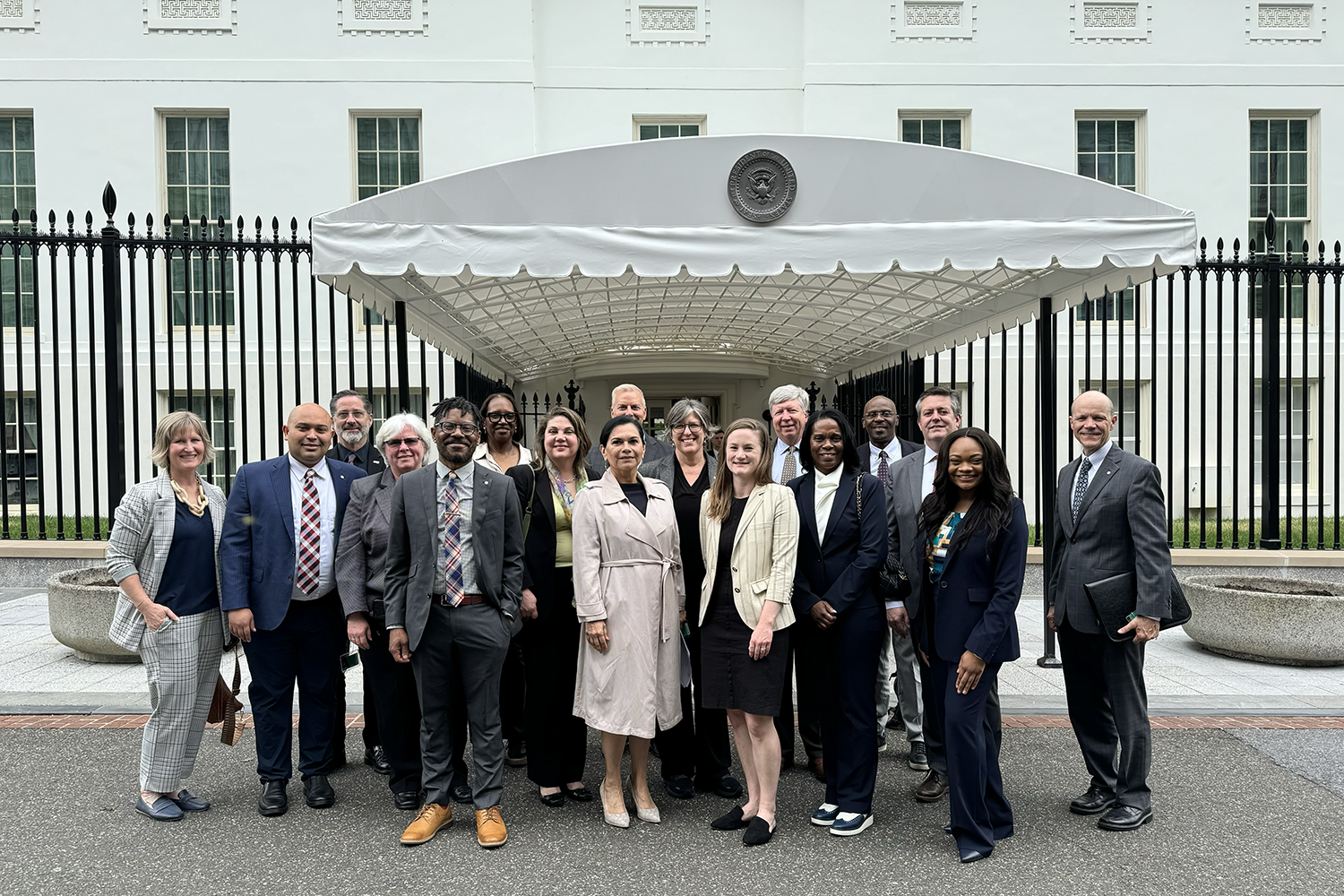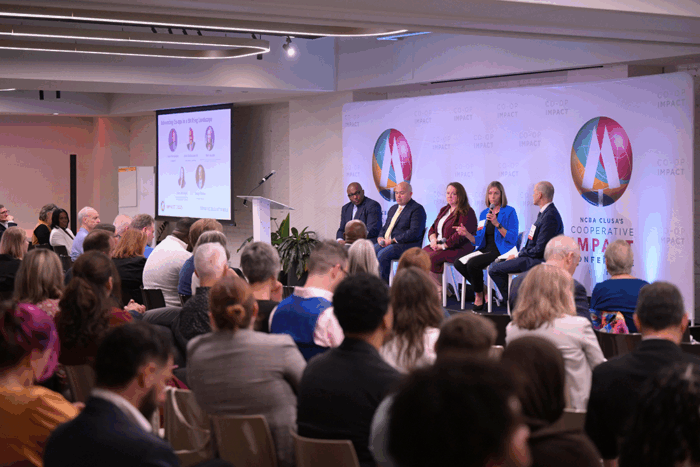
Hundreds of cooperators from across sectors gathered in Washington, DC the first full week of October for the National Cooperative Business Association (NCBA)’s 9th Annual Cooperative IMPACT Conference. During a year that brought policy and funding shifts that will alter the country’s cooperative landscape for years to come, IMPACT 2025 was a moment to come together and move forward with strategy, clarity and purpose.
It was also a reminder that cooperatives were created to address market failures and respond to structural crises. From electric cooperatives powering rural America when it wasn’t profitable to worker co-ops tackling a broken care economy, co-ops thrive in the face of uncertainty and challenge.
“This is what co-ops are built for,” Keri Jacobs said. Jacobs, executive director of the Graduate Institute of Cooperative Leadership at the University of Missouri, helped kick off IMPACT 2025 during a candid, solutions-focused conversation about the policy and funding realities shaping the future of co-ops.
As many co-op developers move away from a reliance on federal dollars—whether by choice or out of necessity—leaning into the broader co-op ecosystem is the path forward, the panel agreed. “That’s when our voice gets really powerful,” Tracy McIntyre, Executive Director of the Montana Cooperative Development Center said, recounting a recent time when credit unions, utility co-ops, farmer co-ops and her association stood behind rural electric cooperatives advocating at the Montana State Capitol.
We took that strategy to Capitol Hill on Wednesday afternoon, when 70 NCBA CLUSA members participated in our third annual Hike the Hill. Despite the federal shutdown, we met with staffers from 32 Members of Congress who sit on committees that are key to co-op economic growth, underscoring co-ops as key partners in building vibrant local economies.
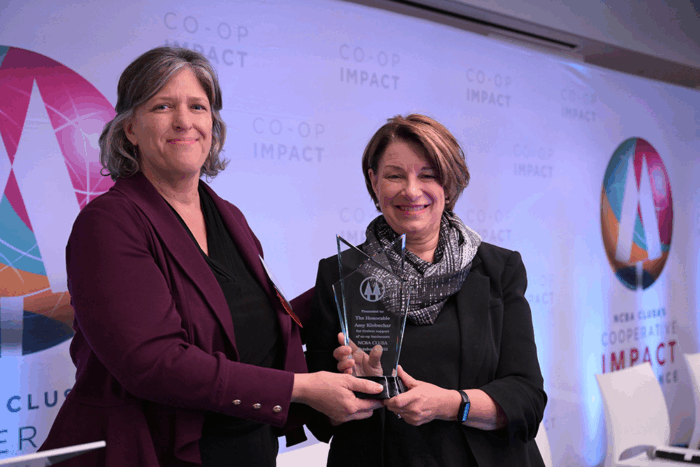
Recognizing co-op champions
Thursday began with the presentation of the 2025 Cooperative IMPACT Champion Awards, which recognize individuals in public service who work tirelessly to create a policy environment that allows cooperative businesses to grow and thrive. Recipients of the award are champions of the values-based businesses that build resilient, inclusive local communities. This year’s recipients were no exception: Representative David Valadao (R-CA) and Senator Amy Klobuchar (D-MN), who accepted her award in person.
Sen. Klobuchar brought IMPACT attendees “greetings from the state of Minnesota where, in the words of our poet laureate Garrison Keillor, ‘the women are strong, the men are good looking and all the co-ops are above average,” she said, referring to the more than 1,000 cooperatives that make Minnesota the leading state for this business model. Four of the 11 largest U.S. co-ops are headquartered in Minnesota; the state is also home to 15 of the country’s top 100 ag co-ops, she said.
“It means a lot to get this award. I want to thank you for the work you do to help families and communities, and for having the backs of the people you serve,” she said, noting how credit unions are offering bridge loans to support federal workers during the shutdown and food co-ops are supporting food insecure community members.
“I continue to believe that courage is standing next to someone you don’t always agree with for the betterment of your community and this country”—a spirit that co-ops demonstrate, Sen. Klobuchar said.
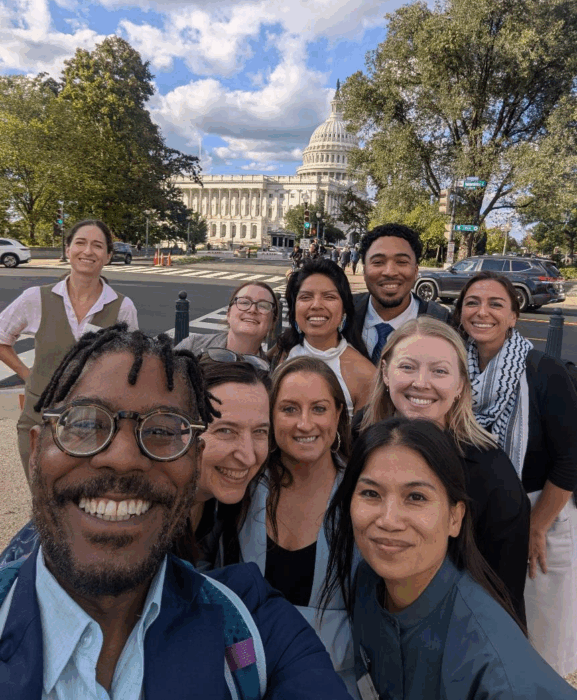
A tool for public awareness and advocacy
Thursday continued with a focus on storytelling. As a tool for public awareness and advocacy, stories are a uniquely powerful way to inspire change and shape policy. A dynamic panel of advocacy experts led by NCBA’s Director of Government Relations Aaliyah Nedd unpacked the federal policy landscape and co-op legislative priorities, equipping attendees to advocate with confidence.
Then a fireside chat with newsroom leaders considered how co-ops are portrayed in the media and offered strategies to help co-ops make headlines. Speakers Maddie Poore, a cofounder of The 51st, and Jasper Wang, Vice President of Revenue & Operations at Defector Media, both represent a burgeoning movement within the news industry: worker-led local journalism. In the ashes of traditional media—almost 80% of newspaper jobs have disappeared in the past 20 years—a new sense of ownership is emerging.
“During the panel, Jasper and I reflected on something that’s keeping us going: Amid all this loss, there’s room to build something better than before,” Poore wrote in a blog. “Our dreams for The 51st are part of a larger movement to build more resilient systems to meet our community’s needs, in a moment when the stakes feel incredibly high.”
Learn more about worker-led local journalism
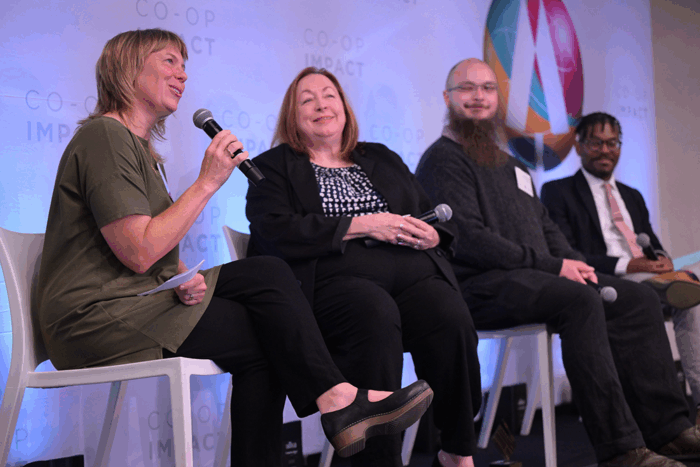
We closed Day 2 with our first-ever film fest. Generously sponsored by National Co+op Grocers with in-kind support from Digital Development Communications, our Year of Co-ops Film Fest highlighted the best in co-op storytelling—from social media reels to mini-documentaries. Out of 42 videos submitted this summer across three categories, the co-ops below were recognized for showcasing how video can capture the heart of cooperation, bring co-op stories to life and connect with audiences in ways that words alone sometimes can’t.
- Best Social Media Video: A Slice of New York for their worker owner spotlight video.
- Best Short-Form Video: Concord Food Co-op for their “What Shopping Local Looks Like” video.
- Best Long-Form Video: New Orleans Firemen’s Federal Credit Union for their “Discover How Banking Can Support a Just Economy” video.
Save the date for IMPACT 2026
We’re already planning IMPACT 2026, which will mark the 10th anniversary of NCBA CLUSA’s Cooperative IMPACT Conference. We’ll return to Convene Hamilton Square on October 7-8, 2026, and look forward to seeing you there!

